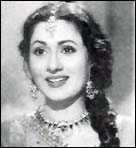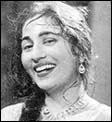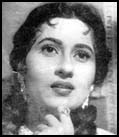|
April 4, 1997
BILLBOARD
QUOTE MARTIAL
MAKING WAVES
SHORT TAKES
ROUGH CUTS
ARCHIVES
|
Dilip Kumar was determined to end all ties between
father
and daughter once he married her
 The scenario was bizarre. With feelings for each other just as
strong, with no other individuals creeping into either of their
lies, they persisted in proceeding to destroy their relationship
almost as if compelled by forces beyond them. In the space of
about five to six years, the near perfect romance had succumbed
to the dictates of its destiny. The scenario was bizarre. With feelings for each other just as
strong, with no other individuals creeping into either of their
lies, they persisted in proceeding to destroy their relationship
almost as if compelled by forces beyond them. In the space of
about five to six years, the near perfect romance had succumbed
to the dictates of its destiny.
While Dilip Kumar appeared to
emerge relatively unscathed, for Madhubala it was the beginning
of the end; the festering wounds she carried never
really healed.
Emotional to a fault, guileless in the bargain,
she was simply not equipped to deal with the shock of the break-up.
Speaking of her, Nadira once remarked: "She had not a strain
of pettiness, of anything small. That girl did not know anything
about hate. She was in love with love exuberantly, overflowing
with love. She had so much to give."
A change began to come over Madhubala, imperceptible at first
but quite apparent to those who knew her. A friend described it
thus: "In 1951, when I first knew her, she was always smiling,
always gay. I envied her peace of mind. By 1958, the beauty was
still there but the peace of mind had vanished."
 The same
year, Filmfare observed: 'Her laughter is a becoming quality,
not only because she comes to life as it were when she laughs
but because a smile is the most charming cloak for a sob... Madhubala
has had her share of struggle, suffering, disillusionment and
emotional shock but no matter what lies beneath the surface she
cloaks it with a graceful smile.' The same
year, Filmfare observed: 'Her laughter is a becoming quality,
not only because she comes to life as it were when she laughs
but because a smile is the most charming cloak for a sob... Madhubala
has had her share of struggle, suffering, disillusionment and
emotional shock but no matter what lies beneath the surface she
cloaks it with a graceful smile.'
Family, or more precisely
paternal opposition and interference, was the undoing of this
romance. Ataullah Khan did not look kindly on the affair and was
determined to break it up. The burden of support of her entire
family still rested on her shoulders and it seemed to have escaped
everyone's attention, including her own, that at some point she
was entitled to a life of her own.
Her father's was a stern and
dominating personality and Madhubala had been in awe of him all
her life. When it came to the crunch, despite the depth of her
feelings for Dilip Kumar, she did not have the courage to defy
and over-ride her father and marry without his approval. Her happiness
hinged on both Dilip Kumar's love, and her father's acceptance
of it; that kind of emotional dependence is no longer seen or
even understood.
To her father was rendered unquestioning obedience,
love and respect. In fact, it is said that when Dilip Kumar started
his own production Ganga Jamuna, he even decided to give
the entire profits of the film to Ataullah Khan so that he and
Madhubala could get married and she could stop working.
According to Dilip Kumar: "She was a very, very obedient
daughter." "I cannot think of marriage," she would
say, "Till I have fulfilled my responsibilities to my family".
This inability to leave her family was her greatest drawback,
believes Shammi Kapoor, for it had to be done at some time: "She
did not know when to break away. Geeta (Bali, Shammi Kapoor's wife) too
was supporting her entire family, who similarly lived off her,
but at one point she decided to leave. She left everything she
had with them, broke away and married me. Madhubala could not
leave her family."
An yet, by the mid-fifties, there were clear indications that
she was nearing a decision. In 1955, she made a bold declaration
in a Filmfare interview: 'Nobody in the world has any right
to interfere with one's choice of a husband. I would marry only
the man with whom I am very much in love.'
 The very next year, it was all over. In the clash of two strong
Pathan egos, in the consequent tensions and unpleasantness, the
relationship floundered and could not survive. "Her overambitious
father," Devika Rani once said, "ruined her life." The very next year, it was all over. In the clash of two strong
Pathan egos, in the consequent tensions and unpleasantness, the
relationship floundered and could not survive. "Her overambitious
father," Devika Rani once said, "ruined her life."
The fierce and unrelenting antipathy to Dilip could not have made
Ataullah Khan an attractive proposition as a future father-in-law.
What went on behind the scenes between the two, and Madhubala,
can only be surmised. Certainly all was not placid smooth-sailing.
Though Dilip Kumar's love for her and his intention to marry her
did not change, he was determined to end all ties between father
and daughter once he married her.
Excerpted from Madhubala, her Life, Her Times, by Khatija Akbar,
UBS Publishers Distributors, 1997, Rs 160, with the publisher's permission.
Back
Madhubala, continued
|

